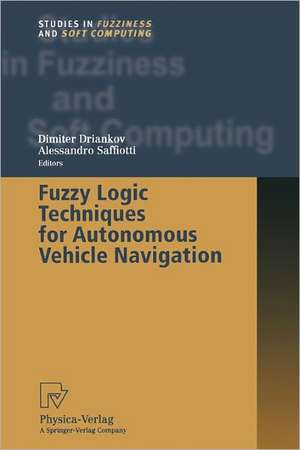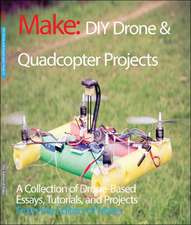Fuzzy Logic Techniques for Autonomous Vehicle Navigation: Studies in Fuzziness and Soft Computing, cartea 61
Editat de Dimiter Driankov, Alessandro Saffiottien Limba Engleză Paperback – 21 oct 2010
| Toate formatele și edițiile | Preț | Express |
|---|---|---|
| Paperback (1) | 949.55 lei 6-8 săpt. | |
| Physica-Verlag HD – 21 oct 2010 | 949.55 lei 6-8 săpt. | |
| Hardback (1) | 955.70 lei 6-8 săpt. | |
| Physica-Verlag HD – 10 ian 2001 | 955.70 lei 6-8 săpt. |
Din seria Studies in Fuzziness and Soft Computing
- 20%
 Preț: 999.85 lei
Preț: 999.85 lei - 20%
 Preț: 653.06 lei
Preț: 653.06 lei - 20%
 Preț: 872.98 lei
Preț: 872.98 lei - 20%
 Preț: 930.57 lei
Preț: 930.57 lei - 20%
 Preț: 1051.00 lei
Preț: 1051.00 lei - 20%
 Preț: 992.44 lei
Preț: 992.44 lei - 20%
 Preț: 655.85 lei
Preț: 655.85 lei - 20%
 Preț: 1001.86 lei
Preț: 1001.86 lei - 18%
 Preț: 954.14 lei
Preț: 954.14 lei - 20%
 Preț: 330.10 lei
Preț: 330.10 lei - 20%
 Preț: 333.04 lei
Preț: 333.04 lei - 20%
 Preț: 997.56 lei
Preț: 997.56 lei -
 Preț: 391.61 lei
Preț: 391.61 lei - 20%
 Preț: 647.79 lei
Preț: 647.79 lei - 20%
 Preț: 986.01 lei
Preț: 986.01 lei - 18%
 Preț: 958.56 lei
Preț: 958.56 lei - 20%
 Preț: 996.40 lei
Preț: 996.40 lei - 20%
 Preț: 999.35 lei
Preț: 999.35 lei - 15%
 Preț: 646.43 lei
Preț: 646.43 lei - 20%
 Preț: 651.57 lei
Preț: 651.57 lei - 20%
 Preț: 997.89 lei
Preț: 997.89 lei - 15%
 Preț: 641.03 lei
Preț: 641.03 lei - 20%
 Preț: 1009.74 lei
Preț: 1009.74 lei - 20%
 Preț: 992.62 lei
Preț: 992.62 lei -
 Preț: 388.72 lei
Preț: 388.72 lei - 18%
 Preț: 1223.43 lei
Preț: 1223.43 lei - 20%
 Preț: 651.42 lei
Preț: 651.42 lei - 18%
 Preț: 951.59 lei
Preț: 951.59 lei - 18%
 Preț: 948.61 lei
Preț: 948.61 lei
Preț: 949.55 lei
Preț vechi: 1157.98 lei
-18% Nou
Puncte Express: 1424
Preț estimativ în valută:
181.70€ • 194.30$ • 151.49£
181.70€ • 194.30$ • 151.49£
Carte tipărită la comandă
Livrare economică 18 aprilie-02 mai
Preluare comenzi: 021 569.72.76
Specificații
ISBN-13: 9783790824797
ISBN-10: 3790824798
Pagini: 404
Ilustrații: VIII, 393 p.
Dimensiuni: 155 x 235 x 21 mm
Greutate: 0.56 kg
Ediția:Softcover reprint of hardcover 1st ed. 2001
Editura: Physica-Verlag HD
Colecția Physica
Seria Studies in Fuzziness and Soft Computing
Locul publicării:Heidelberg, Germany
ISBN-10: 3790824798
Pagini: 404
Ilustrații: VIII, 393 p.
Dimensiuni: 155 x 235 x 21 mm
Greutate: 0.56 kg
Ediția:Softcover reprint of hardcover 1st ed. 2001
Editura: Physica-Verlag HD
Colecția Physica
Seria Studies in Fuzziness and Soft Computing
Locul publicării:Heidelberg, Germany
Public țintă
ResearchCuprins
I: Tutorials.- Fuzzy Logic in Autonomous Navigation.- A Reminder on Fuzzy Logic.- II: Design of Individual Behaviors.- Mobile Robot Path Tracking and Visual Target Tracking Using Fuzzy Logic.- Fuzzy Logic for Fusion of Tactical Influences on Vehicle Speed Control.- Neuro-Fuzzy Control for Basic Mobile Robot Behaviours.- The Role of Fuzzy Logic Control in Evolutionary Robotics.- III: Coordination of Behaviors.- Resolving Conflicts Between Behaviors Using Suppression and Inhibition.- Multi-Layered Fuzzy Behavior Fusion for Reactive Control of Autonomous Robots.- Fuzzy-Behavior Synthesis, Coordination, and Evolution in an Adaptive Behavior Hierarchy.- Multiple Objective vs. Fuzzy Behavior Coordination.- IV: Mapping the Environment.- Accurate Map Building via Fusion of Laser and Ultrasonic Range Measures.- Map Generation by Co-operative Autonomous Robots Using Possibility Theory.- Integrating Linguistic Descriptions and Sensor Observations for the Navigation of Autonomous Robots.- V: Layer Integration.- MORIA: A Robot with Fuzzy Controlled Behaviour.- Integrating Deliberative and Reactive Strategies via Fuzzy Modular Control.- List of Contributors.
Textul de pe ultima copertă
The goal of autonomous mobile robotics is to build and control physical systems which can move purposefully and without human intervention in real-world environments which have not been specifically engineered for the robot. The development of techniques for autonomous mobile robot operation constitutes one of the major trends in the current research and practice in modern robotics. This volume presents a variety of fuzzy logic techniques which address the challenges posed by autonomous robot navigation. The focus is on four major problems: how to design robust behavior-producing control modules; how to use data from sensors for the purpose of environment modeling; and how to integrate high-level reasoning and low-level behavior execution. In this volume state-of-the-art fuzzy logic solutions are presented and their pros and cons are discussed in detail based on extensive experimentation on real mobile robots.
Caracteristici
Presentation of state-of-the art fuzzy logic techniques used to solve the major problems in autonomous robot navigation Reproducibility of proposed solutions by the reader Discussion of pros and cons of using fuzzy logic techniques on the basis of extensive experimentation on real mobile robots











